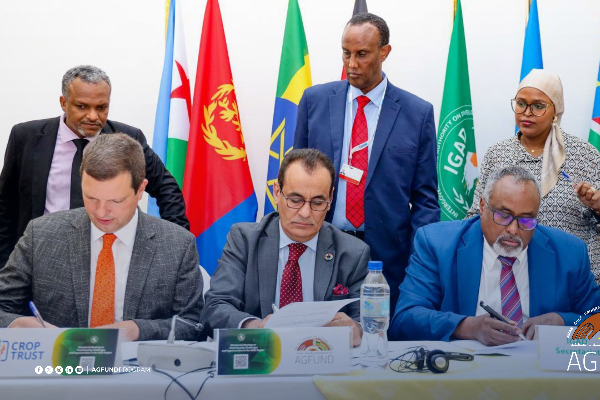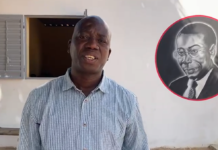
The Intergovernmental Authority on Development (IGAD) has signed a landmark Memorandum of Understanding (MoU) with the Arab Gulf Programme for Development (AGFUND) and the Crop Trust in a bold move to combat the deepening food insecurity crisis in the Horn of Africa.
The agreement, signed on the sidelines of the Arab Coordination Group (ACG) meetings, establishes a strategic partnership aimed at advancing regional food security and climate resilience through coordinated, long-term interventions. The initiative comes at a time when millions of people across IGAD member states are grappling with food shortages, worsened by prolonged droughts, conflict, and climate change.
According to a joint statement, the MoU focuses on six critical pillars: digital financial inclusion, support for gene banks and the conservation of agricultural biodiversity, digital agriculture solutions, capacity building and institutional development, rainwater harvesting and sustainable water management, and the strengthening of early warning systems and disaster preparedness.

IGAD Executive Secretary Dr. Workneh Gebeyehu hailed the partnership as a turning point in regional efforts to tackle chronic hunger and build long-term resilience.
“We are witnessing a multidimensional food crisis that demands urgent, coordinated, and innovative responses,” said Dr. Gebeyehu. “This MoU demonstrates our shared commitment to ensuring no one in the region goes hungry, while building the systems and institutions that will secure food and nutrition for generations to come.”
The agreement leverages AGFUND’s development financing and the Crop Trust’s expertise in agricultural biodiversity and seed conservation to bolster IGAD’s regional food security initiatives. By aligning resources and technical expertise, the partnership is expected to accelerate the implementation of regional strategies that support both emergency responses and long-term sustainability.
Dr. Gebeyehu emphasized the importance of protecting the region’s agricultural genetic resources as a hedge against climate shocks and future food crises.
“Preserving agricultural biodiversity through support for gene banks is vital to safeguarding our food systems. It ensures farmers have access to climate-resilient crops and adaptive solutions in the face of changing weather patterns,” he said.
Digital agriculture solutions and financial inclusion are also central to the agreement, reflecting a growing emphasis on technology-driven transformation in the agricultural sector. The MoU aims to expand smallholder farmers’ access to digital platforms and financial services that enhance productivity, market access, and resilience.
“Technology and finance are powerful tools for empowering our farmers, especially women and youth, who are the backbone of our food systems,” Dr. Gebeyehu added.
In addition, the focus on rainwater harvesting and sustainable water management is expected to ease the pressure on scarce water resources and mitigate the impacts of recurrent droughts. IGAD has previously warned that erratic rainfall and poor water infrastructure have significantly reduced agricultural output and heightened food insecurity across the region.
The partnership also prioritizes the enhancement of early warning systems and disaster preparedness mechanisms to better anticipate and respond to climate-related emergencies. By integrating data and strengthening institutions, IGAD and its partners hope to reduce the vulnerability of communities across the Horn of Africa.
With this MoU, IGAD, AGFUND, and the Crop Trust are signaling a new era of collaboration anchored in sustainability, innovation, and regional solidarity.
“We are not only addressing today’s hunger but laying the foundation for a resilient and food-secure Horn of Africa,” said Dr. Gebeyehu.







